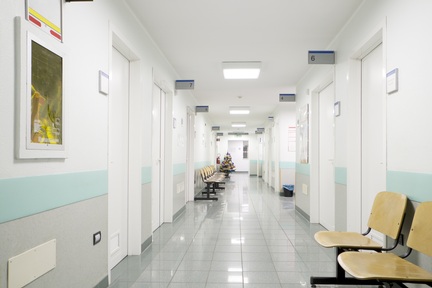Many hospitals do not have clear signage and handrails for people with dementia
Many hospitals are failing to provide dementia-friendly facilities such as signage and decor, according to the Health and Social Care Information Centre.
In what is the first report into how dementia-friendly hospitals are, the Health and Social Care Information Centre (HSCIC) gave healthcare settings a national average score of 75 per cent, with a lowest score of 40 per cent and a highest rating of 100 per cent.
The report said the dementia figures were "relatively low" in comparison to other elements such as cleanliness, rated at 97 per cent and patient dignity at 86 per cent.
The results from the 2015 Patient-Led Assessments of the Care Environment (PLACE) programme, published by HSCIC reveal the importance of the environment that care is provided in.

Self-assessments completed by NHS and private healthcare providers revealed non-clinical factors, such as: cleanliness, hydration, food and the extent that a patient’s privacy and dignity were respected in relation to the provision of care to people living with dementia.
Of those surveyed, sites rated as providing the most dementia-friendly environment were found to be those specialising in care for people with Mental Health and Learning Disabilities – scoring 84.8 per cent, while the national average was 74.5 per cent.
Commenting on the report, chief executive of Independent Age, Janet Morrison, said: “These figures reveal that a significant number of hospitals and care settings still have a long way to go to fully meet the needs of patients with dementia. It’s estimated that just over a quarter of the over 70s admitted to hospital have previously diagnosed dementia and 50 per cent have some form of cognitive impairment. The Prime Minister David Cameron has talked of an ongoing challenge to tackle dementia. This challenge must continue by providing improved and appropriate hospital care and more dementia friendly environments for patients with this long-term condition.”
Assessments focused on areas considered most important to patients, families and carers. The programme was created to encourage a range of principles established by the NHS constitution, including: putting patient’s first, encouraging public, patients and staff feedback, striving to ensure basic quality care is provided within a clean and safe environment.
Head of policy at Alzheimer’s Society, George McNamara, said: “Despite the rising numbers of people with dementia, these figures reveal that many hospitals and care settings are still not adequately equipped to meet their needs and there is alarming regional variation. It is vital dementia friendly facilities, such as clear signage and handrails, are in place consistently across the country so that people with the condition can be cared for appropriately.
“New environments can be very frightening and disorientating for people with dementia. Through the Dementia Friendly Hospitals project we aim to give people and their families the confidence that they are receiving the best possible care. Already 110 hospitals have signed up and many are already implementing change, with many more interested. Now this commitment must be turned into action. With a strong focus on integrated health and social care we can build a national network of dementia-friendly hospitals and care settings that can transform dementia care and support.”
Assessment teams visited and assessed more than 4,500 wards, more than 2,200 outpatient departments and more than 350 emergency and minor injury units. Further assessments were made on food provisions and more than 1,000 sites were assessed to see how they met dementia criteria.
More than 280 sites declared that patients with dementia would not be admitted to their sites being assessed, due to the nature of the service being provided, such as Adolescent Mental Health Services.
Latest News Analysis
 04-Sep-19
Extra £1.5 billion announced for social care in Chancellor's Spending Review
04-Sep-19
Extra £1.5 billion announced for social care in Chancellor's Spending Review
 02-Jul-19
Department of Health forced to rethink care homes' nursing rates after legal challenge
02-Jul-19
Department of Health forced to rethink care homes' nursing rates after legal challenge
 18-Jun-19
Overnight care workers forced to sleep in offices and told 'bring your own bedding'
18-Jun-19
Overnight care workers forced to sleep in offices and told 'bring your own bedding'
 14-Jun-19
Back in the closet: Third of care home staff have had no LGBT+ awareness training
14-Jun-19
Back in the closet: Third of care home staff have had no LGBT+ awareness training
 11-Jun-19
PM candidates on social care: Rory Stewart calls fixing care an 'unfinished revolution'
11-Jun-19
PM candidates on social care: Rory Stewart calls fixing care an 'unfinished revolution'